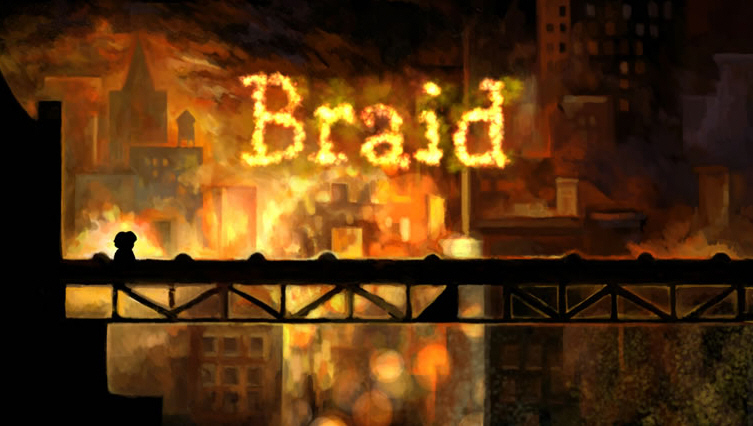*This post contains spoilers about the game Braid, probably the biggest spoiler ever*

Recently, I've been replaying some old games, as you might now (please, please know that about me. It means you're paying attention and you love me). Braid was one of those games. Playing it again reignited my love affair with that masterpiece, and I began to pester my cousin Ed into playing it.
He played it and he loved it, like any reasonable person should. I was so excited for him to get to the end for one of the best twists I've ever seen. I tried to temper my excitement for it. My language tends to become very hyperbolic when I love something, so I'm worried that about overhyping everything.
I was disappointed when he beat the game and totally missed the twist. It's not because Ed isn't an intelligent and insightful man, because he is. Much more so than I, at any rate. It was because he doesn't play games as much as I do.
First a little expository dialogue. Braid is a game that plays with the mechanics of time. Speeding, slowing, reversing are all in there. One of the things that makes Braid so great is how the concept of time, and the gameplay mechanic itself, are infused into the story. So at the end *last spoiler alert warning*, when your character is helping the princess escape the villain and get back to her house, you have no choice but to play the entire sequence backward. Everything gets turned completely on its head. Rather than helping the princess into the safety of her home, she finds you looking at her through her bedroom window and tries to escape you. The sequence gets an entirely different meaning when simply played in reverse. If none of this makes sense, just watch this video. (Jump to :25 if you're THAT impatient, sheesh)
The first time I played the game, I was freaking out. Totally flipping the F out. I couldn't believe what was happening. Here I thought I was the hero the whole time, and it turns out I'm the unwitting villain! Chasing after a relationship wasn't endearing, it was obsessive and damaging to her. My character was a stalker.
So why did Ed miss this? He brought up something that I wouldn't have thought of without his perspective. It's because he is used to an older style of gaming. A style where the story and gameplay elements are almost entirely separate. Playing a game was simply a matter of "Play the game, watch the story, play the game, watch the story" over and over until the end. He wasn't looking for meaning in the final time reversal, he was just waiting for it to be over so he could keep playing. He was viewing it as a gameplay element rather than a story element.
I'm a good example of a "modern" gamer, as Ed put it. I'm versed in the styles and techniques of modern independent and art gaming. I was actively looking for meaning in the gameplay itself. So when I saw how things were unfolding as the rewind button was held, it seized me.
I think this points to something very significant about the current state of gaming. Games are getting closer to being art (I would just argue they already are). The same thing happens with film. Someone who has studied film is much more able to pick up on the nuances and techniques the director uses to imbue meaning. Someone who is watching films for the first time might not see these things. It's not that they are unintelligent, just unfamiliar.
Right now, the percentage of games that I would consider "art" is very low. But then, so was film when it started.

No comments:
Post a Comment